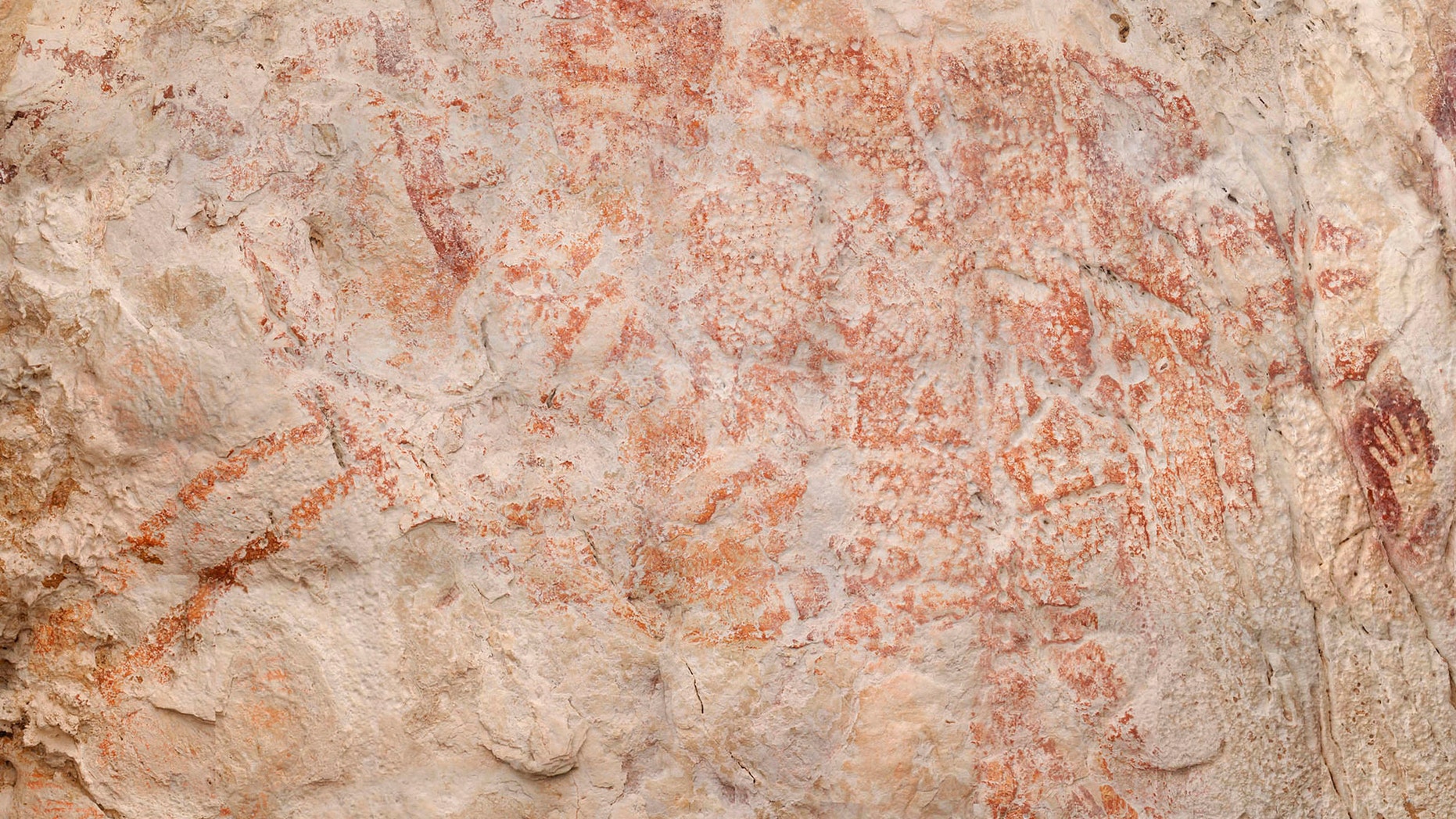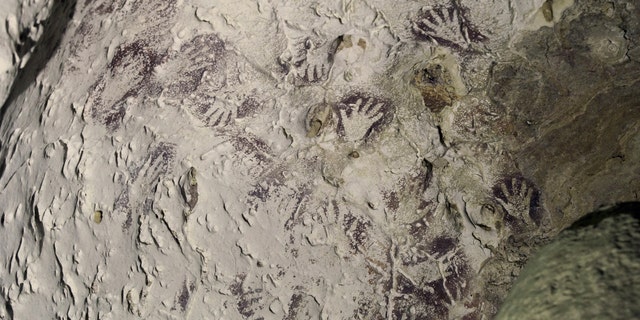
This composite image from the book "Borneo, Memory of the Caves" shows the world’s oldest figurative artwork dated to a minimum of 40,000 years, in a limestone cave in the Indonesian part of the island of Borneo.
(Luc-Henri Fage/kalimanthrope.com via AP)
The red silhouette of a bull-like beast on the wall of a cave in the Indonesian part of Borneo is the oldest example of an animal drawing, experts say.
Researchers say that the 5-foot-wide sketch is at least 40,000 years old. This would make it slightly older than similar animal paintings found in famous caves in France and Spain. Until a few years ago, experts believed Europe was where mankind's ancestors started drawing animals and other figures.
“The oldest cave art image we dated is a large painting of an unidentified animal, probably a species of wild cattle still found in the jungles of Borneo – this has a minimum age of around 40,000 years and is now the earliest known figurative artwork,” said Maxime Aubert, an associate professor at Australia’s Griffith University, in a statement.
SCIENTISTS SAY INDONESIA CAVE DRAWINGS THE SAME AGE AS THOSE IN EUROPE
Aubert led the research project, which also included Indonesia’s National Research Centre for Archaeology (ARKENAS), and the Bandung Institute of Technology (ITB). The study is published in the journal Nature.

This undated photo provided by Kinez Riza shows mulberry-colored hand stencils in a cave in the Indonesian part of the island of Borneo. This particular style of hand stencil dates to the height of the Last Glacial Maximum about 20,000 years ago.
(Kinez Riza via AP)
Scientists note that, while Borneo is Earth’s third largest island, for most of the Ice Age, it formed the easternmost tip of the vast continental region of Eurasia. Europe was at the western extremity of the vast 8,078-mile-wide landmass.
“It now seems that two early cave art provinces arose at a similar time in remote corners of Palaeolithic Eurasia: one in Europe, and one in Indonesia at the opposite end of this ice age world,” said Griffith University Associate Professor Adam Brumm, who participated in the study, in a statement.
MYSTERIOUS ROCK ART UNCOVERED IN CAVES ON UNINHABITED CARIBBEAN ISLAND
The remote limestone caves on Borneo have been known to contain prehistoric drawings since the 1990s. To reach them, Aubert and his team used machetes to hack through thick jungle in a verdant corner of the island.
Strapping on miners' helmets to illuminate the darkness, they walked and crawled through miles of caves decorated with hundreds of ancient designs, looking for artwork that could be dated. They needed to find specific mineral deposits on the drawings to determine their age with technology that measures the decay of the element uranium.
In 2014, Aubert and his fellow researchers reported on cave art from the neighboring Indonesian island of Sulawesi. Measuring uranium decay, they dated hand stencils, created by blowing red dye through a tube to capture the outline of a hand pressed against rock, to almost 40,000 years ago.
PREHISTORIC CAVE BELIEVED TO BE 10 MILLION YEARS OLD FOUND IN TEXAS
With the Borneo cave art, the scientists are able to construct a rough timeline of how art developed in the area. In addition to the bull, they dated red- and purple-colored hand stencils and cave paintings of human scenes.
After large animal drawings and stencils, "It seems the focus shifted to showing the human world," Aubert said.
Rock art discoveries continue to be a source of fascination for archaeologists. Last year, researchers uncovered a vast array of mysterious pre-Columbian rock art in the caves of a remote uninhabited Caribbean island.
Archaeologists made the discovery while exploring around 70 cave systems on Puerto Rico’s Mona Island. The thousands of designs, created centuries ago, comprise the largest concentration of indigenous pre-Columbian rock art in the Caribbean, according to experts.
The Associated Press contributed to this article. Follow James Rogers on Twitter @jamesjrogers
Source: Read Full Article